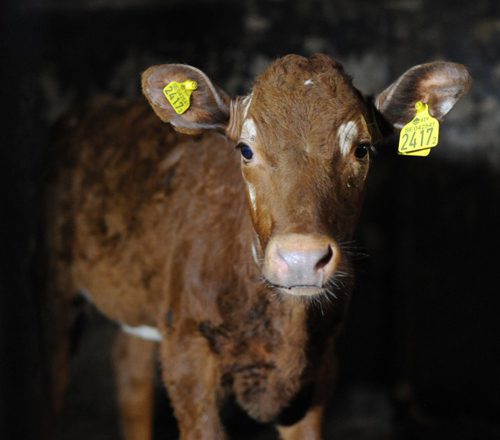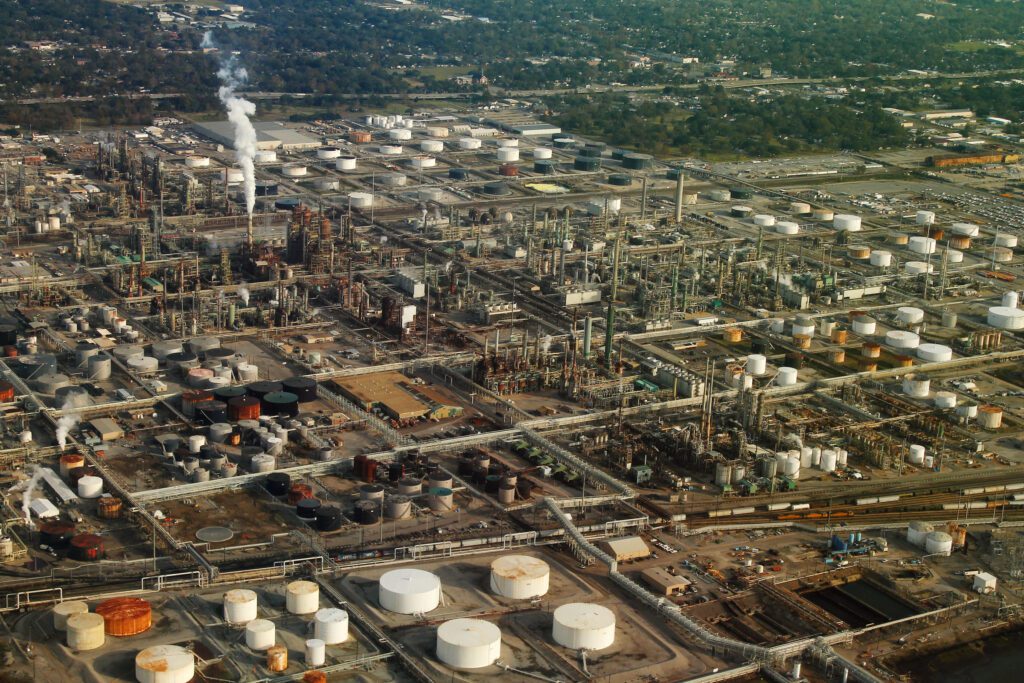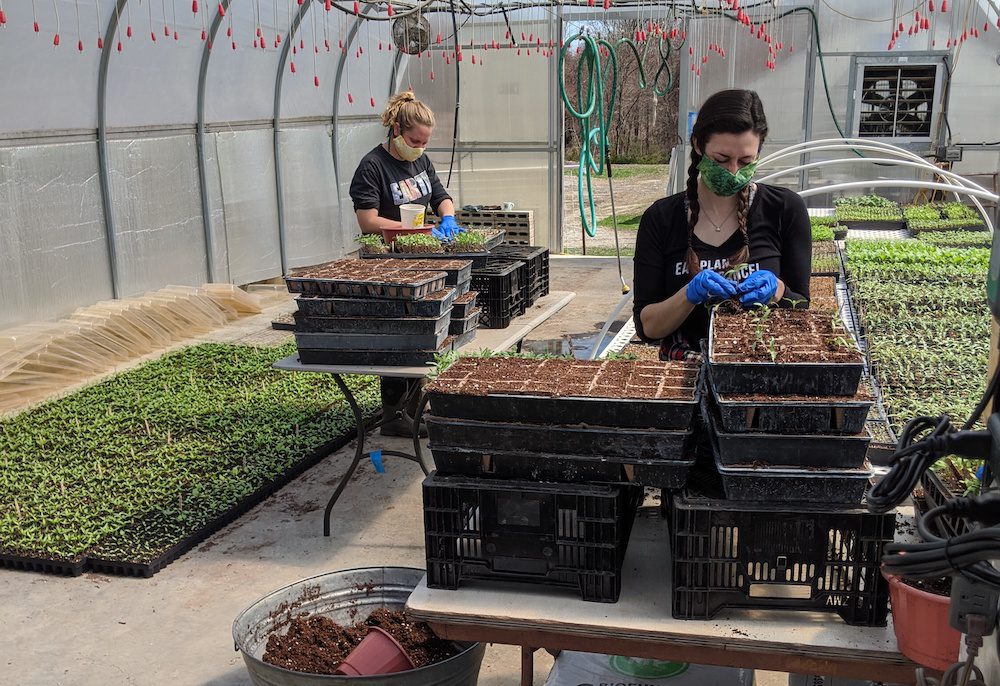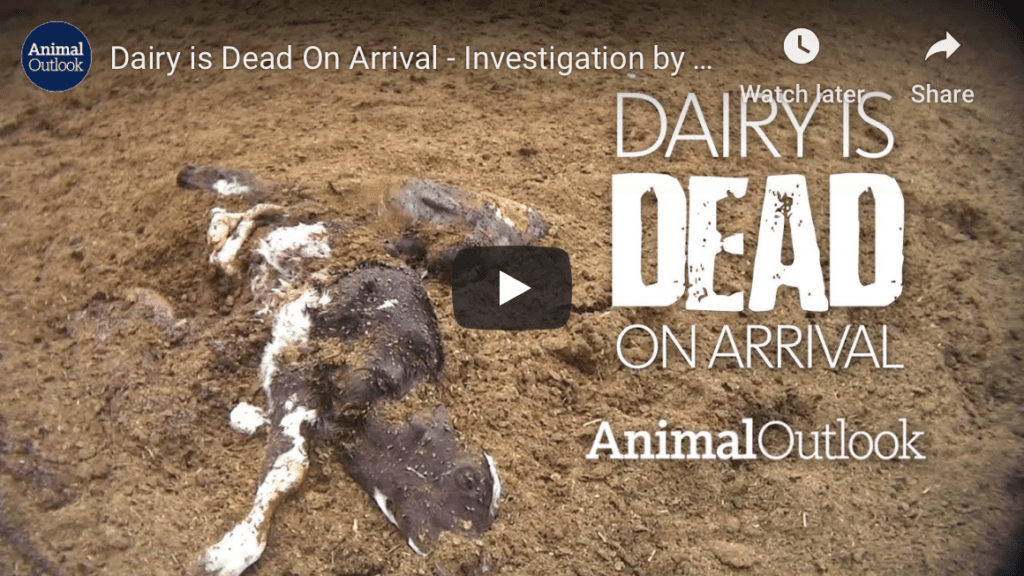
We Animals)


By Reynard Loki, Independent Media Institute
6 min read
For more than two years, Erin Wing served as an undercover investigator for Animal Outlook, an animal advocacy organization nonprofit based in Washington, D.C., during which time she conducted multiple investigations, including one of a dairy factory farm in 2019, after which Nestlé dropped the farm and added more vegan options. Her final assignment before choosing to leave the field was to document the cruelty to cows happening every day behind closed doors at Dick Van Dam Dairy, a massive factory farm in San Jacinto, California. Wing recently revealed her true identity, writing earlier this month, “I’m now stepping out of the shadows to shine a light on the stomach-churning horrors I witnessed.”
Using a hidden camera, she documented shocking cruelty, from cows being violently kicked, jabbed and shocked by workers, sick cows producing blood-tinged pink milk, calves covered in flies and left to languish in the mud, and a lack of euthanasia or veterinary care, leaving sick cows to slowly die, with their dead, decomposing bodies left among living cows. In addition, Wing documented “downed” or “spent” cows—cows who are so sick, injured or weak that they are no longer able to stand—dragged by chains and painful “hip clamps,” lifted over walls using tractors. These downed cows, who are no longer useful to the dairy industry, are often killed for their meat. This tragic reality is a reason that “ethical vegetarians” who consume dairy products are actually supporting the beef industry: About a third of dairy cows are ultimately killed for their meat.
“This is where milk comes from—a profit-driven industry that treats these gentle, smart and social animals like mere milk-producing machines or unwanted by-products,” Wing writes. After reviewing the investigation, the Animal Legal Defense Fund, an animal law nonprofit based in Cotati, California, filed a lawsuit against Dick Van Dam Dairy and the individuals caught on camera for violating California animal cruelty laws and the San Jacinto Municipal Code through the neglectful treatment of cows and calves.
While animal cruelty in the industrialized food system is rampant—factory farming is the largest cause of animal abuse in history—consumer views on the treatment of farmed animals changing. Nearly half of Americans would support a ban on the factory farming of animals, according to a 2017 poll, with 70 percent having “some discomfort with the way animals are used in the food industry.”
Now prominent lawmakers in Washington are taking action. Senators Cory Booker (D-NJ) and Elizabeth Warren (D-Mass.) joined forces to advance federal legislation that would ban large-scale factory farming in the United States over the next two decades. The Farm System Reform Act seeks to place a moratorium on large-scale factory farming. It would also strengthen the Packers and Stockyards Act of 1921 to require country of origin labeling on beef, pork and dairy products. Rep. Ro Khanna (D-CA) is also co-sponsoring the effort, introducing companion legislation to the House of Representatives.
These shifting public attitudes are resulting in an increased demand for plant-based (i.e., cruelty-free) milk, which is putting the future of dairy farming into question. Last year, the U.S. saw the largest annual decline in the number of licensed dairy operations in more than 15 years. “The recent acceleration of the decline reflects how difficult it is to operate a dairy, particularly in the last several years,” reported the American Farm Bureau Federation, a lobbying group representing the U.S. agriculture industry, in February. “Since the end of 2014, dairy farmers have struggled with low prices resulting from large supplies outweighing demand, in the U.S. and around the world.”
Dick Van Dam Dairy supplies milk to Dean Foods, America’s largest milk processor, based in Dallas. In November, the company filed for bankruptcy. The majority of its assets, including the brands Alta Dena and TruMoo, are now owned by Dairy Farmers of America, the nation’s largest dairy cooperative. “Dean Foods’ business has struggled as more consumers turn to non-dairy milk,” writes Amelia Lucas of CNBC, noting that the U.S. Department of Agriculture data shows that Americans’ milk consumption has fallen 26 percent over the past 20 years.
While the steady move away from dairy is something for animal advocates to cheer about, we are a long way from reforming our broken and inhumane food system. In the U.S. alone, nearly 10 billion land animals are raised on factory farms and killed in slaughterhouses every single year, accounting for 99 percent of farmed animals in the nation. In the U.S., there are approximately 9 million dairy cows. But these cows are far from just numbers—every one of them is an individual, with an individual personality. Dr. Marc Bekoff is professor emeritus of ecology and evolutionary biology at the University of Colorado, Boulder, and the co-founder with Jane Goodall of Ethologists for the Ethical Treatment of Animals. He writes on Psychology Today that cows are “highly sentient and intelligent individuals with markedly different personalities … display[ing] a full range of personalities including boldness, shyness, sociability and gregariousness.”
But confined and abused in our inhumane food system, they are treated as nothing more than capitalist objects. Betty Stoneman, who teaches philosophy at Emory University, wrote an essay applying Marx’s theory of “estranged labor” (i.e., workers’ alienation from the products of their labor) to animals on factory farms. She writes: “On factory farms animals live confined to small cages, unable to enjoy the full range of their possible movements and among their own waste. Animals undergo painful physical modifications designed to enhance their productivity and to combat the stress reactions they develop due to their living conditions. Animals are deprived of being able to live their lives as they naturally would either as individuals or as members of social groups.” This misery is generally kept hidden from the public, with the factory farm industry in several states shielded by anti-whistleblower legislation, known as “ag-gag” laws.
It is also worth remembering that a dairy cow is also a mother, with maternal instincts to care for and defend her young. Forcibly impregnated so that she is kept in a constant and painful cycle of pregnancy, birth and lactation, this poor, abused mother must also suffer the relentless theft of her babies, who are taken away from her within hours of their birth. “This forced separation often causes cows to bellow for hours or even days, pacing and searching for their calves,” writes Joe Loria of Mercy for Animals, a nonprofit that, like Animal Outlook, has been at the forefront of exposing the behind-the-scenes horrors of factory farming.
“I saw abuse and neglect every single day,” Wing said about her harrowing undercover mission. “I feel a special bond toward cows now because of it, and it will always stay with me. A part of me will always be with them as well.”
- Sign the petition urging Dairy Farmers of America to shift at least 20 percent of its supply chain (Dean Foods included) to vegan dairy alternatives, and end cruel dehorning.
Cause for concern…

“People across the country are waking up to structural racism and coping with police brutality and civil unrest while also living through the nightmare of the COVID-19 pandemic,” writes Earth | Food | Life contributor Sharon Lavigne, on Truthout. “They’re mourning losses and longing for life to get back to normal. But in St. James Parish, Louisiana, where I’m from—a predominantly Black and low-income community nicknamed “Cancer Alley”—racism, brutality, loss and unrest are normal. In fact, a new plastics complex and President Trump’s decision to gut the National Environmental Policy Act (NEPA) stand to make things even worse.”
- If we don’t act now, the entire U.S. could become a “Cancer Alley” (Sharon Lavigne, Truthout)
- Court lets Exide abandon toxic site—taxpayers will fund cleanup (Tony Barboza, The Los Angeles Times)
- Trump EPA may violate courts with new rule extending life of hazardous coal ash ponds (Rebecca Beitsch, The Hill)
- Wildfire smoke in U.S. exposes millions to hazardous pollution (Matthew Brown and Camille Fassett, Associated Press)
- Shark species nearly vanishes in just 40 years due to overfishing (John R. Platt, The Revelator)
Round of applause…

In a recent op-ed published by our friends at Local Futures, “big picture activist” Henry Coleman condemns the “corporate-led, techno-globalist future we are being sold,” arguing that localizing our food systems is “the single most meaningful solution to climate breakdown.”
- What to do when the world is on fire (Henry Coleman, Local Futures)
- Shippers close to global deal to cut greenhouse gas pollution (Jess Shankleman and Ewa Krukowska, Bloomberg Green)
- After horrific cases, Greece moves to make animal cruelty a felony (The National Herald)
- Kroger expands plant-based brand after exceeding $2.5 billion in sales (Liam Gilliver, Plant Based News)
- Vegan cheese from small Spanish town named one of the world’s best cheeses (Vegconomist)
Parting thought…

“The grocery store became a site for mourning: the innocuous refrigerators filled with milk, yogurt, cheese, butter, and eggs; the freezers of ice cream; the cases of meat, neatly packaged and priced—these suddenly became, to me, the products of immeasurable violence.” —Kathryn Gillespie, The Cow With Ear Tag #1389 (University of Chicago Press, 2018)
Earth | Food | Life (EFL) explores the critical and often interconnected issues facing the climate/environment, food/agriculture and nature/animal rights, and champions action; specifically, how responsible citizens, voters and consumers can help put society on an ethical path of sustainability that respects the rights of all species who call this planet home. EFL emphasizes the idea that everything is connected, so every decision matters.
Click here to support the work of EFL and the Independent Media Institute.
Questions, comments, suggestions, submissions? Contact EFL editor Reynard Loki at [email protected]. Follow EFL on Twitter @EarthFoodLife.
